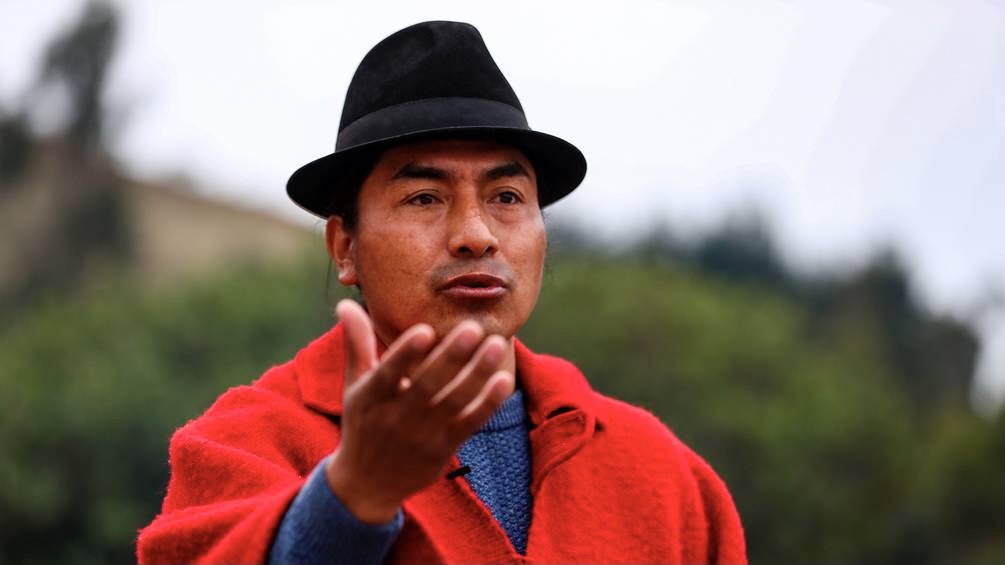Indigenous leader and the President of the Confederation of Indigenous Nationalities of Ecuador (CONAIE), Leonidas Iza Salazar, was released in the early hours of June 15 after being arrested 24 hours ago. CONAIE, one of the main promoters of the indefinite national strike that began against the neoliberal economic policies of the right-wing government of President Guillermo Lasso on June 13, celebrated Iza’s release and thanked all those who mobilized demanding his freedom.
“Leonidas Iza Salazar is free! After 24 hours of illegal detention and due to social pressure in the framework of the national strike, the judge ordered his immediate release. The mobilization continues with the 10 demands raised, thank you all for the solidarity shown. Long live social struggle!,” tweeted CONAIE, one of Ecuador’s largest Indigenous organizations.
Iza was arbitrarily, illegally and violently arrested by the officials of the Ecuadorian national police and armed forces in the Pastocalle village in the Cotopaxi province in the early hours of June 14. The authorities arrested him for the alleged crime of paralyzing public services on June 13, the first day of the national strike which saw thousands of protesters block roads across the country in rejection of the rising fuel prices, soaring cost of living and increasing insecurity in Ecuador.
Following Iza’s arrest, CONAIE’s Vice President Zenaida Yasacama condemned it and called on its members and associated organizations to continue protesting at the national level in defense of their demands and their leader’s freedom. Yasacama also called on international human rights organizations to remain vigilant in the face of violation of human rights and the right to social protest.
On June 14, members of various Indigenous and social organizations hit the streets in different parts of the country, including in the capital Quito, demanding Iza’s release. In Cotopaxi, hundreds marched to the provincial Attorney General’s Office, condemning Iza’s arrest and demanding his immediate release. Their demonstration was met with heavy repression by police and several protesters were beaten up by the officers.
Desde la provincia de Bolívar las comunidades base de la Fecab Brunari marchan por el centro de Guaranda exigiendo #LibertadLeonidasIza y manteniendo la convocatoria del #ParoNacional pic.twitter.com/8wVFZdCXRT
— CONAIE (@CONAIE_Ecuador) June 14, 2022
En la provincia de Cotopaxi se reporta una violenta agresión a periodistas por parte de la Policía Nacional y FFAA.
Reporteros de Cordillera-Medio de Comunicación fueron violentados y destruidos sus equipos mientas cubrían la represión en las afueras de la cárcel Latacunga. pic.twitter.com/kcTPV09u0p
— CONAIE (@CONAIE_Ecuador) June 15, 2022
While hundreds took to the streets in Iza’s support, CONAIE’s legal team filed Habeas Corpus for his immediate release. At around 9:45 pm (local time), the hearing began in a Cotopaxi court. The prosecutor and Iza’s defense team both presented their arguments.
Prosecutor Marisela Yánez accused Iza of commiting “crimes that affected citizens’ rights to free mobility and free movement.” Meanwhile, Iza denounced that the officials kept him incommunicado from his family and lawyer and forced him to sign documents without telling him what they were for in the absence of his lawyer.
Judge Paola Bedón dismissed Iza’s allegations, accepted prosecutor Yánez’s allegation and declared his arrest as legal. However, she ordered his immediate release, imposing alternative measures to preventive detention. Judge Bedón prohibited Iza from leaving the country and ordered him to appear before the provincial Attorney General’s Office every Wednesday and Friday.
Following his release, Iza was received by his family members, friends and colleagues, who welcomed him back with slogans “Friend Leo, the people are with you” and “Long live the struggle.”
#ATENCION
Momento en que @LeonidasIzaSal1 sale en libertad luego de permanecer 24 horas detenido ilegalmente. Es recibido por familiares, amigos y más compañeros, posteriormente acudirá con las bases indígenas y dará declaraciones. pic.twitter.com/eQo5fkIdVr— CONAIE (@CONAIE_Ecuador) June 15, 2022
CONAIE rejected the prosecutor’s allegation and condemned the Lasso administration for criminalizing their social protests. The confederation ratified that the national strike would continue peacefully until their demands were accepted by the national government.
The demands of the Indigenous, peasant and social organizations, who have been carrying out the indefinite national strike since June 13, include: reduction and freeze of fuel prices; soft loans for farmers, small producers and merchants; fair prices for their farm products; better employment opportunities and labor guarantees; total ban on mining and oil exploitation activities in Indigenous territories; respect for the 21 collective rights of Indigenous peoples and nationalities; an end to privatization of public companies; price control policies for essential products; access to education and healthcare in rural areas; and an end to drug trafficking, kidnappings and violence.





